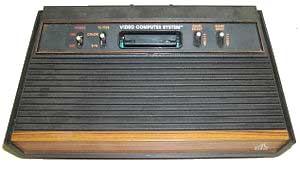I had a high-tech CEO ask me the loaded question to end all loaded questions the other day. What makes a technology company succeed?
It’s almost impossible to come up with a single answer, or even a single set of answers. What do Google, Microsoft, YouTube, MySpace, Digg, Mozilla, Adobe, Dell, and Apple have in common? I came up with a number of factors off the top of my head — empowering users, keeping a steady pace of innovation, good PR, making easy-to-use products — but none of them seemed to be the end-all, be-all of high-tech success.
So I decided to look at the question from the opposite angle. What makes a technology company fail? Here are a handful of companies from the past twenty years that strike me as prime examples of organizations who lost a commanding lead and/or market dominance in a particular field due to their own idiocy or incompetence.
 1. Atari. The mass market videogame console was more or less invented by Atari in the late ’70s. Their only real competitor for years was Mattel’s Intellivision, which may have had vast technical superiority but had inept marketing. (George Plimpton? You’ve got to be kidding me.) But instead of innovating, Atari took the road of suing anyone and everyone who touched its much-beloved system. (Activision, Coleco, Starpath, Odyssey, Nintendo, Phillips, and Epyx all suffered Atari’s litigious wrath.) There was also a precipitous drop-off in videogame quality, as anyone who remembers notoriously bad media tie-ins like E.T. The original company was sold off many times and finally diluted to nothingness in the ’90s. The name still had such cachet, however, that Infogrames later licensed it for themselves.
1. Atari. The mass market videogame console was more or less invented by Atari in the late ’70s. Their only real competitor for years was Mattel’s Intellivision, which may have had vast technical superiority but had inept marketing. (George Plimpton? You’ve got to be kidding me.) But instead of innovating, Atari took the road of suing anyone and everyone who touched its much-beloved system. (Activision, Coleco, Starpath, Odyssey, Nintendo, Phillips, and Epyx all suffered Atari’s litigious wrath.) There was also a precipitous drop-off in videogame quality, as anyone who remembers notoriously bad media tie-ins like E.T. The original company was sold off many times and finally diluted to nothingness in the ’90s. The name still had such cachet, however, that Infogrames later licensed it for themselves.
2. Netscape. Netscape partisans and Microsoft haters have long promoted the urban legend that Microsoft drove this company into obscurity. And while Bill Gates & Co.’s anti-competitive practices certainly helped, ultimately the blame lies with the company itself. Netscape was running neck-and-neck with Microsoft in the browser wars for several years until its hideous Navigator 4 browser (which earned the company the Nutscrape label, among many other less complimentary names). Undeterred by their slipping fortunes, the company followed Navigator 4 with… nothing. For years. They pursued a ruinous portal strategy instead and sold out to AOL, who let the company completely die on the vine. Now Netscape is stuck with a dying portal website and an also-ran browser that piggybacks on both Internet Explorer and Firefox.
3. Palm. The early PalmPilots finally found the magic formula that had eluded so many other companies for so long. They were easy to use, integrated tolerably well with your PC, and were extremely reliable machines. No wonder the company built up such a network of software developers. And then a long series of ownership switches threw the platform’s future in the toilet. The result? Microsoft’s Pocket PC platform (now Windows Mobile) overtook the Palm on basic, must-have features (like oh, say, enabling a contact to have both a home and business address, which the Palm still can’t do). I read recently that the Palm OS actually still funnels everything through emulation software for its ancient Dragonball processor, which is a good indicator of how far behind the innovation curve these folks have gotten.
4. America Online. In order to get on the Internet in the mid-’90s, the average household could go one of two routes. They could download a program called Trumpet Winsock and configure connection strings until they tore out their hair, then FTP down a series of Internet apps of varying quality. Or they could install America Online off a single floppy disk and be up and running in minutes. AOL was on top of the world at the turn of the millennium with their buyouts of Time Warner and Netscape. What happened? They turned out to be, well, a bunch of cowards. AOL so feared getting shut out of the Windows 95 desktop and losing new customers to Microsoft’s new MSN service that they bowed to Redmond’s wishes. They continued licensing Microsoft’s Internet Explorer browser and simply let the Netscape browser die a slow death. And then, in one of the most astoundingly stupid business moves ever, they utterly failed to come up with a broadband strategy until — well, they still don’t have one. I thought one of the main reasons they bought Time/Warner in the first place was to get a hold of its cable networks. Wha’ happened?
5. Apple. Steve Jobs brought the modern window-based GUI to the masses via Apple’s revolutionary Macintosh computer. His reward? Getting booted out of the company by a corporate board too concerned about Steve’s titanic ego and famous inability to play nice with others. Baaaaad mistake. The corporate stiffs (Amelio, Sculley) who followed Jobs utterly failed to grasp what made Apple so unique, and pursued a course towards unexciting, run-of-the-mill products. The company was headed for the permanent dustbin of history by the early ’90s when it had lost every market except that of the graphic design world. (Meanwhile, Steve Jobs was off creating his own horribly inept company, NeXT.) But this story had a happy ending. Apple brought Jobs back aboard, the iMac and iPod were born, and the rest is history.
6. Sony. The company’s name has been practically synonymous with quality consumer electronics for a generation. But that reputation is starting to tarnish, and Samsung is now just as much of a quality brand as Sony ever was. The company has stubbornly bet the farm on its Blu-Ray high-definition videodisc, earning the ire of consumers and unnecessarily delaying the release of its Playstation 3. (Didn’t they learn anything from their own disastrous Betamax experiment?) The Playstation 3 might turn out to be the company’s redemption — or it could be the point when the company’s videogame consoles permanently ceded ground to Microsoft’s XBox.
7. Gateway. Dell, Compaq, and Gateway were once fierce competitors for the crown of the PC industry, which boggles the mind. (Who remembers that Big Country was once just as popular and revolutionary a band as U2?) The quality of Gateway’s equipment dropped off precipitously in the late ’90s, with a number of high-profile hardware recalls. And then the company spent way too much money pursuing a boutique retail presence while Dell was busy staying as far away from retail as possible. Lately Gateway has made something of a comeback, but they’ve got a long way to go to catch up to Dell.
 8. Compaq. Owning an “ultra-portable” Compaq laptop was a status symbol in the ’80s. Then the company spent several years creating their own proprietary drivers and components in an attempt to make their machines premium products. Instead they pissed everyone off. For several years, at least, Compaq machines were every computer tech’s worst nightmare (although the laptop I used from 2000 to 2003 was a pretty reliable machine). The company’s purchase by a troubled Hewlett-Packard has relegated its products to also-rans in the marketplace.
8. Compaq. Owning an “ultra-portable” Compaq laptop was a status symbol in the ’80s. Then the company spent several years creating their own proprietary drivers and components in an attempt to make their machines premium products. Instead they pissed everyone off. For several years, at least, Compaq machines were every computer tech’s worst nightmare (although the laptop I used from 2000 to 2003 was a pretty reliable machine). The company’s purchase by a troubled Hewlett-Packard has relegated its products to also-rans in the marketplace.
9. Intuit. What happened to Quicken? Quicken was personal finance software for more than a decade. Then the company hung around waiting for Microsoft to acquire them — which Bill Gates & Co. did indeed try to do, only to be stymied by anti-trust regulators. Quicken is still the market leading personal financial product, but it’s fighting a neck-and-neck battle with Microsoft Money. Quicken differentiates itself these days by tying in to the company’s irritating and ad-strewn websites, which doesn’t strike me as a recipe for success. The company now stakes out the niches of home tax preparation software (TurboTax) and small business finance (QuickBooks), where their products succeed because nobody’s made a serious effort lately at unseating them.
10. RealNetworks. Once upon a time, RealAudio was the coolest thing on the planet. I’m not sure when the company began its slide into irrelevance — when was the last time you watched anything in RealVideo? — but the ad-laden disaster RealOne Player surely was a major turning point. It took the much-loved and highly functional Real Jukebox and hobbled many of its features or made them premium add-ons. Like Netscape before them, it seems the company largely got spooked by the dominance of Microsoft and tripped over their own feet.
—
So there we have it: ten tech companies, ten high-profile failures. The main causes? Seems to me they are failure of nerve, failure to innovate, excessive greed, excessive litigiousness, and overwhelming fear of Microsoft. Am I missing anything?